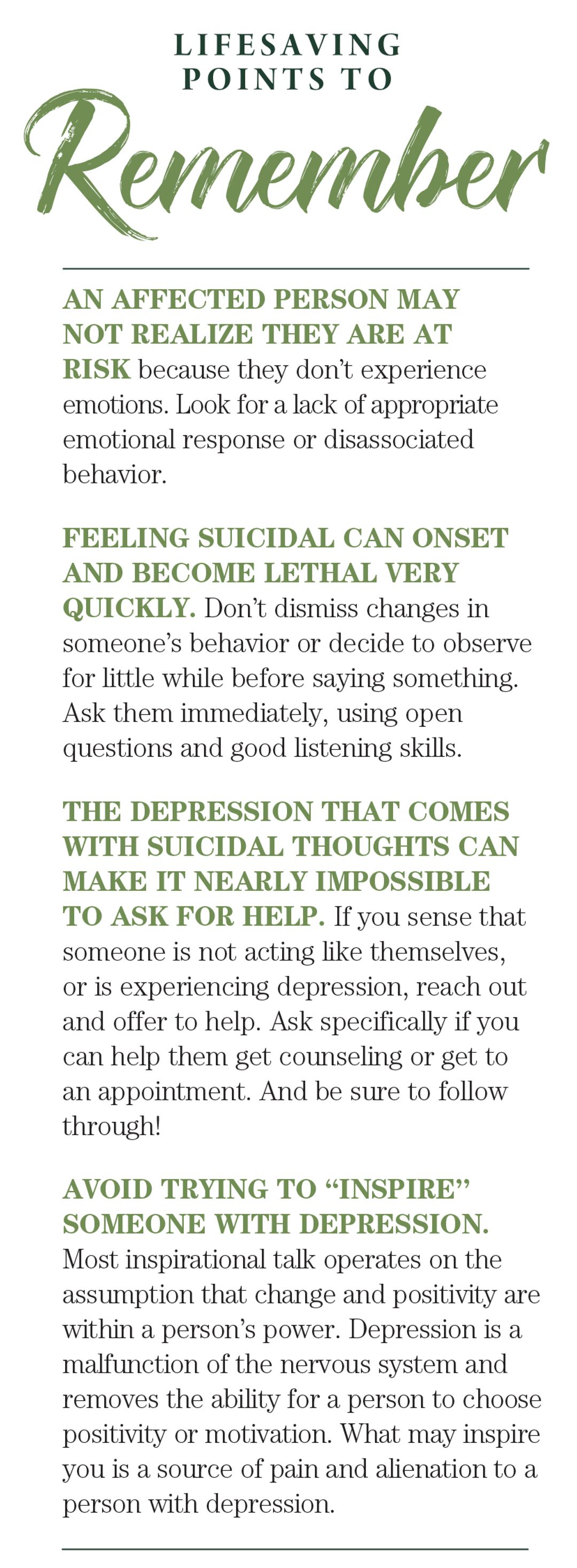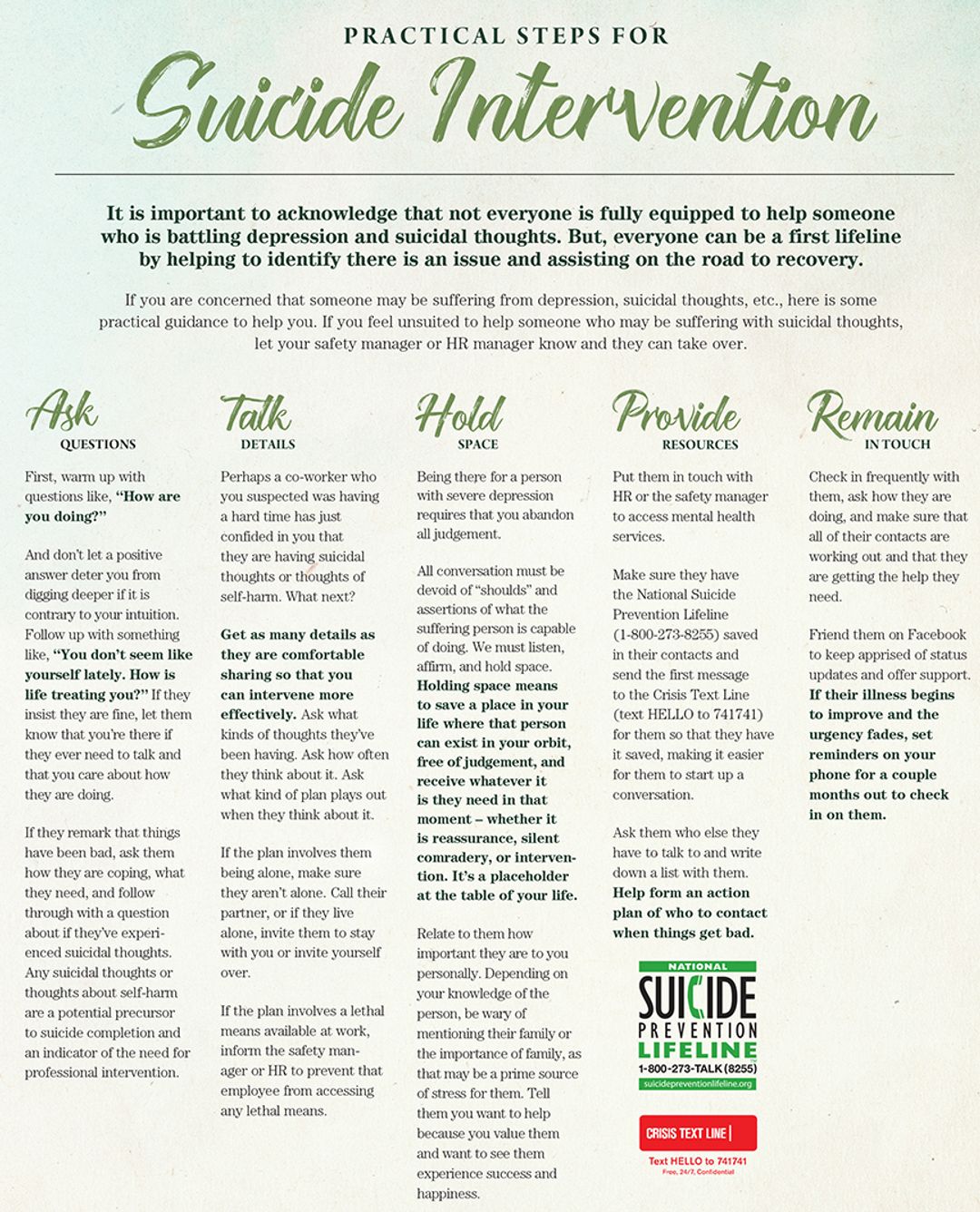My name is Aja. I am a mom, a construction financial manager, and a community volunteer. And, I am alive today because I survived my suicide attempt. This account of my own failed suicide attempt and recovery will provide insight into the mind of someone experiencing suicidal thoughts because, unless you’ve experienced it personally, there are things that you can’t understand about what it means to be suicidal. By sharing this very personal experience, my hope is that you will be better able to detect and help others who are suffering from suicidal states.
Progression of Symptoms
When my son was nearly a year old, I had just escaped an abusive relationship and was living with my parents until I could get back on my feet. I don’t remember exactly when the symptoms started, because I didn’t even have the presence of mind to realize something was wrong.
At some point, I began having strong physical reactions while at work. I would suddenly, and with no apparent cause, break out in a cold sweat and begin shaking. Sometimes it would progress to uncontrollable crying and hyperventilating. I either worked through it, or would excuse myself until it was over. At the time, these episodes seemed emotionless, and I only saw them as inconvenient. A boss noticed and recommended that I see a doctor.
Now, this is important: I was unconcerned with what I was experiencing because I couldn’t feel anything. I was incapable of realizing that something was wrong with me because the triggers (i.e., neurotransmitters) that usually spur us into action and signal pain were not functioning properly for me. I felt nothing – no happiness or sadness. I persevered in an emotionless vacuum.
Since I worked at the same company as my mom and carpooled with her every day, it was easy to get by in this manner. My parents were my safety net and I was lying in it, operating in only the basest of functions necessary to get by.
Soon, however, my neurotransmitters began to sink below the threshold of no emotion and I began to experience what are known as “suicidal thoughts.” I put quotes around this phrase because this is an almost laughable oversimplification.
When I was in that emotionless vacuum, they weren’t just “thoughts” – they were auditory hallucinations. They were my evil twin from a parallel world wearing an invisibility cloak. They were my rational mind and will to live locked in a tower, looking down on the soulless shell of my body, acting and reacting.
These “thoughts” began as a small voice, quietly whispering to me, “You’re the worst,” “You don’t deserve any of this,” “Your family would be better off without you,” “You should kill yourself.” As these thoughts progressed, the voice got louder and I began to believe what it was saying. I started looking for a way to escape by suicide. Before long, I was thinking about it constantly.
Sometimes, the “thoughts” caused me intense shame and pain, but a lot of the time I lacked the energy or emotional capacity to feel anything other than resigned agreement.
One day, I mentioned to my mom that I felt like killing myself. Due to the lack of pain in my voice, my mom misunderstood the severity of my confession and remarked, “We all feel that way sometimes.” I simply did not have the energy to convince her that I was serious and took her lack of concern as evidence that the voice was correct – that I wasn’t important to my family.
Failed Attempt
It was a Wednesday. I had thought of seeking help, but then realized that I didn’t have any money until payday on Friday. I became so desperate to escape by ending my life that I couldn’t even wait two days. I was at work and running through plans in my mind, considering different lethal means that I could use.
I had decided on a method, but the will to live in me reached out one more time for help. I gathered the last shreds of strength I had to tell a co-worker as he was on his way out to lunch, “I’m seriously thinking about killing myself.” He looked concerned and caught off guard, and said, “Don’t do anything, okay?”
It’s important to understand that when a person reaches the point that they are ready to end their life, breaking through the void of darkness to reach out for help takes an immense amount of strength and energy. In fact, it takes more energy to reach out for help than it does to attempt suicide.
I don’t know how long I waited after that, but it felt like eternity. I used the last wisp of energy I had to walk to the bathroom, down two huge handfuls of Tylenol, and go out to the car to close my eyes for what I hoped would be the last time. Luckily, I wasn’t working at a desk and smart phones didn’t exist back then, so I wasn’t able to research this method. Only later did I discover that it is not fatal, but can potentially lead to liver poisoning.
I had further luck when I woke up at some point in the night and expelled whatever had not yet been digested. Thankfully, I have not suffered any long-term effects from this failed attempt, but if I had access to a more lethal means that day, I would not be here now.
Survival & Recovery
Two days later, I told my mom about what had happened. She helped me get into counseling and I was diagnosed with post-traumatic stress disorder (PTSD) and depression. Within a few days of starting medication, I was nearly 100% better.
The solution to my condition was quick, effective, and painless, yet I was convinced that death was my only option. The timeline of these events – from the onset of physical manifestations of PTSD to my suicide attempt – occurred over the course of two months. Time passes differently for people suffering from depression; what felt like a couple of months to my mother felt like a year to me.
Months after, I was still working for the same company, but had moved to the accounting department. I was recovering from my mental illness and on medication. Life was relatively good, if not challenging in all of the normal ways.
Then, one day, I was making inventory adjustments on index cards and nodded off briefly. When I came to a moment later, I had written “I WANT TO DIE” on the line that I was adjusting.
It didn’t look like me, it didn’t feel like me, but my hand was in the writing position at the end of the sentence. It reminded me that I am not the illness that is affecting me and that recovery lasts long past feeling normal again.
It’s important to realize that people are brought to this desperate place for many reasons, and no one has the same internal experience. However, what we all have in common is that, in these dark moments, we are completely and utterly alone without the strength to search for and grasp a lifeline. In these moments, we need you – our family, friends, and co-workers – to reach out for our sinking hand and, with your strength, pull us back to the surface.


Copyright © 2018 by the Construction Financial Management Association (CFMA). All rights reserved. This article first appeared in March/April 2018 CFMA Building Profits magazine.